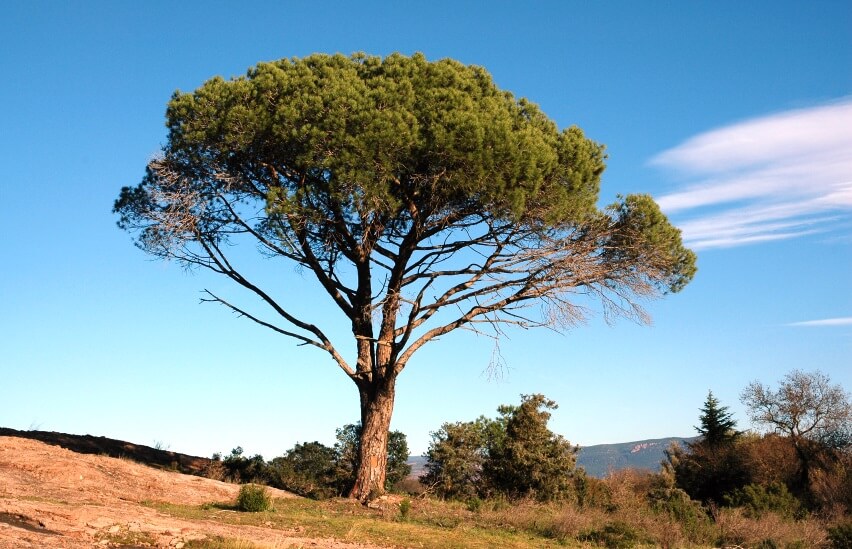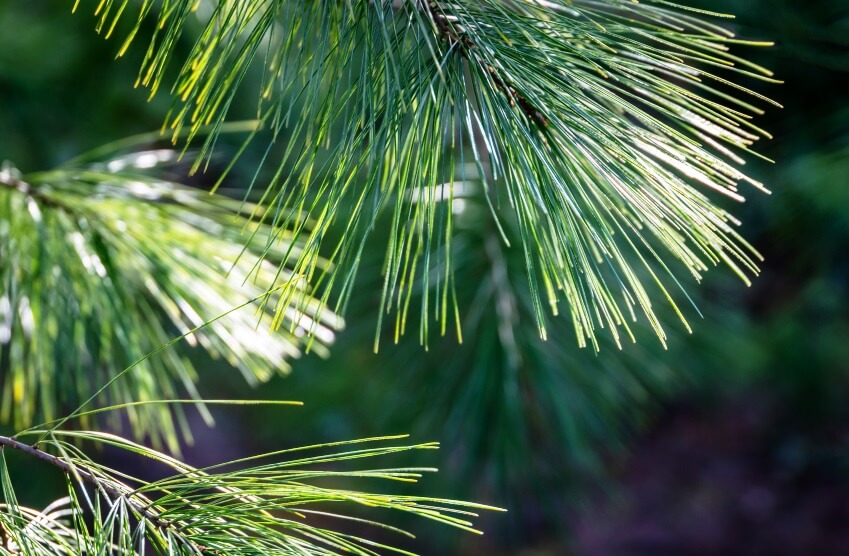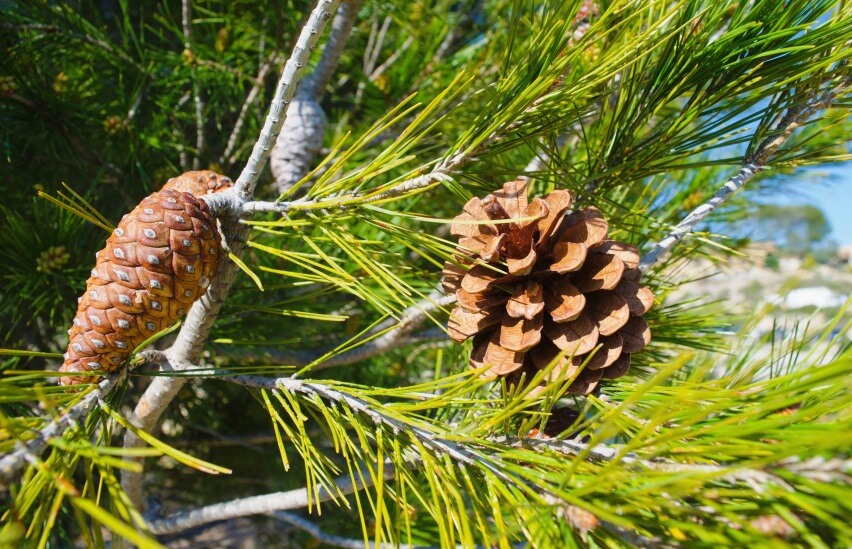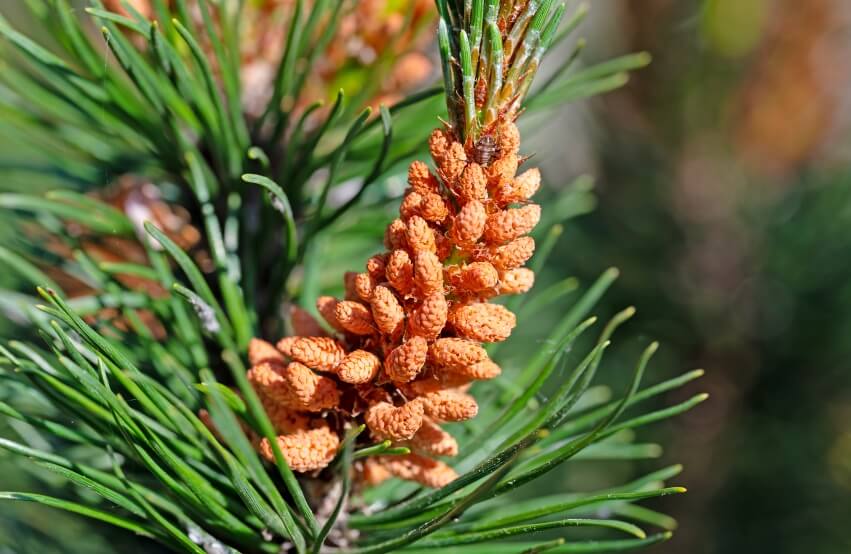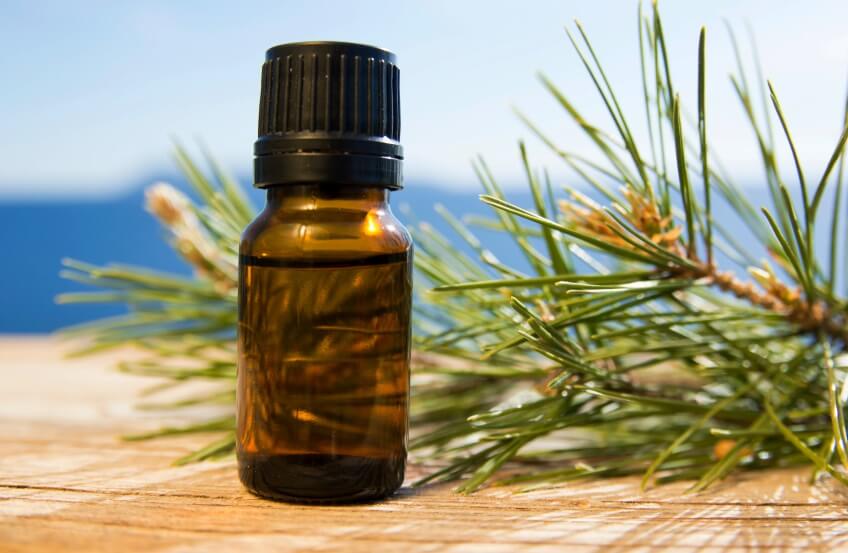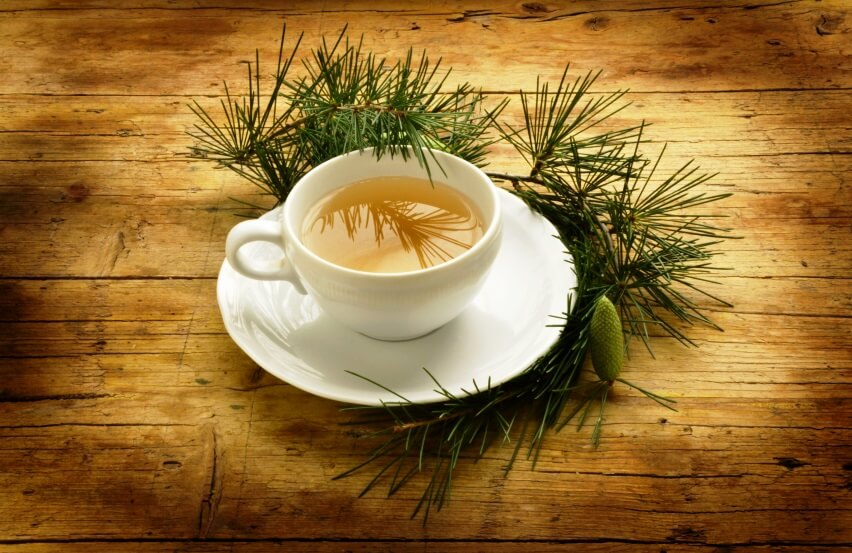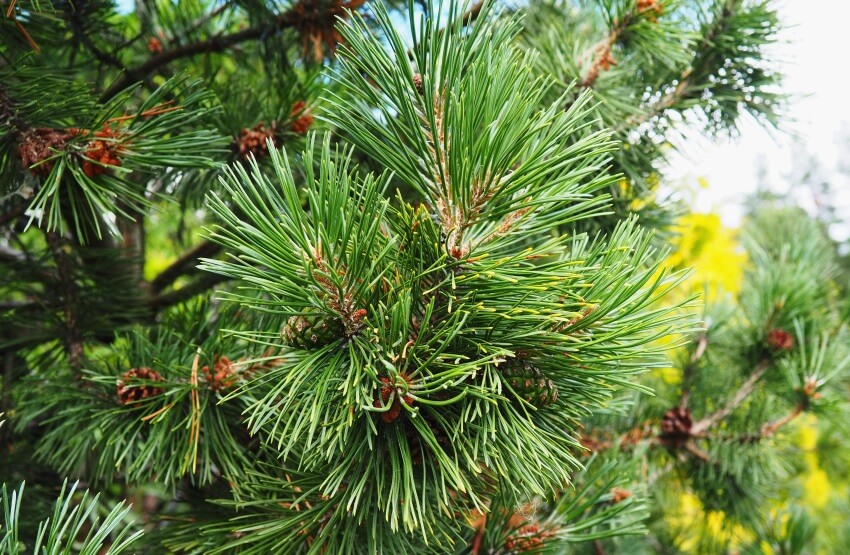Pine (Pinus) trees, with their majestic appearance and fresh scent, have long been an integral part of nature’s beauty. Beyond their aesthetic appeal, these evergreen trees offer numerous benefits and possess remarkable versatility across various aspects of human life. From their ecological importance to their essential uses in various industries, pine trees have continuously proved their significance. In this article, we will talk about the benefits and uses of pine trees. We will also discuss the different ways we can use them in our day-to-day lives.
If you are interested in this topic, you can also read
<<Cedar Tree Benefits>> and <<Garden Cress Seeds Benefits>> articles.
Ecological Importance
Pine trees play a crucial role in maintaining ecological balance and supporting biodiversity [1]:
Soil Stabilization
Their extensive root systems anchor the soil, preventing erosion and landslides.
Oxygen Production
As evergreen trees, pine trees continue to photosynthesize throughout the year, releasing oxygen into the atmosphere.
Carbon Sink
Being efficient absorbers of carbon dioxide, pine trees help mitigate climate change by sequestering substantial amounts of carbon.
Pinus Halepensis tree
Uses Of Pine Trees
Timber and Construction
The wood from pine trees is highly valued in the timber industry due to its diverse array of applications [2]:
Building Material
Pine lumber is used in construction for structural elements, beams, and flooring due to its strength, durability, and cost-effectiveness.
Furniture
Pine wood’s attractive grain and easy workability make it a popular choice for crafting furniture, cabinets, and decorative items.
Paper Pulp
Pine trees are a valuable source of wood pulp used for producing paper, including newsprint, tissue, and cardboard.
Pine Needle Applications
Beyond the wood, various parts of pine trees, especially the needles, possess numerous uses:
Landscaping and Mulch
Pine needles make excellent mulch to retain soil moisture, regulate temperature, and suppress weed growth. They are also used decoratively in landscaping.
Medicinal Purposes
Pine needle extracts are known for their rich sources of vitamin C and other antioxidants. They are used in traditional medicine to boost the immune system and alleviate respiratory conditions.
Crafts And Potpourri
Pine needles are commonly used in creating crafts such as baskets, weaving, and pine needle art. They also contribute to the aromatic blend of potpourri.
Benefits Of Pine Trees
Pine Oil Benefits
Essential oil extracted from the needles, twigs, bark, and cones of the pine tree boasts a wide range of therapeutic properties. From promoting respiratory health to aiding in relaxation, pine oil has a remarkable versatility. Here are the various benefits of pine oil and its potential uses.
Respiratory Health
One of the key benefits of pine oil lies in its ability to support respiratory health. Its expectorant properties make it an excellent choice for individuals suffering from congestion, coughs, or colds. Inhalation or steam therapy with pine oil can help clear nasal passages and promote easy breathing. Additionally, this natural remedy may aid in relieving symptoms of asthma and bronchitis.
Anti-Inflammatory Properties
Pine oil has also been recognized for its potent anti-inflammatory properties. Its active compounds, such as alpha-pinene and beta-pinene, play a significant role in reducing inflammation within the body. Regular use of pine oil can offer potential benefits to individuals experiencing rheumatoid arthritis, joint pain, or muscle soreness. It may help alleviate discomfort and promote overall joint health [3, 4].
Mental Wellness
The refreshing aroma of pine oil has a profound effect on mental well-being. In aromatherapy, inhaling the scent of pine oil is known to enhance mental clarity, increase focus, and improve concentration. This makes it an ideal choice for those needing a cognitive boost during work or study. Furthermore, pine oil’s uplifting properties can help alleviate stress, anxiety, and fatigue, promoting a sense of calm and relaxation [5, 6].
Anti-Microbial Properties
Pine oil contains natural anti-microbial agents that can be beneficial in fighting against harmful bacteria and fungi. A few drops of pine oil in household cleaning products can help disinfect and purify surfaces. Additionally, it can be used as an insect repellent, especially against household pests like mosquitoes, ticks, and fleas.
Anti-Tumor Properties
Pine needle essential oil has been reported to play a critical biological activity in cancer. It has been shown that pine needle essential oil suppresses tumor progression in breast cancer [6].
Skin And Hair Health
Incorporating pine oil into your skincare routine can provide numerous benefits for the skin and hair. Due to its antiseptic properties, pine oil can help combat acne and blemishes. It also acts as a natural cleanser, providing deep pore cleansing and removing excess oil. For hair health, pine oil promotes a healthy scalp, preventing dandruff and dryness. Its stimulating properties may also aid in promoting hair growth [7].
Pine Needle Tea Benefits
A natural wonder that has gained popularity in recent years is pine needle tea. Derived from the leaves of various pine tree species, this herbal tea offers a myriad of health benefits that have caught the attention of wellness enthusiasts worldwide. Pine needle tea is rich in nutrients, boasting an impressive range of antioxidants, vitamins, and minerals. Some of the important health benefits of pine needle tea are as follows [8].
Immune System Boost
Pine needle tea is known to strengthen the immune system due to its significant levels of vitamin C. By incorporating this tea into your routine; you can provide your body with additional defense against common illnesses and infections.
Rich Source Of Antioxidants
Antioxidants play a crucial role in protecting our cells from damage caused by free radicals, which are known to contribute to aging and chronic diseases. Pine needle tea contains high levels of antioxidants that help combat oxidative stress and promote overall well-being.
Anti-Microbial Benefits
Studies have shown that pine needle tea possesses anti-microbial properties, which means it may help fight against harmful microorganisms. This makes it an appealing option during cold and flu season or when you’re simply looking for an extra layer of protection against bacterial infections.
Digestive Aid
For those experiencing digestive issues such as bloating or indigestion, pine needle tea may offer relief. It has been traditionally used to aid digestion and support a healthy gut due to its natural enzymes and compounds that promote better digestion and nutrient absorption.
Calming Effects
With its pleasant aroma and soothing properties, pine needle tea can have a calming effect on the mind and body. Many people find it helpful for reducing anxiety and stress and promoting better sleep quality.
While pine needle tea offers various health benefits, it is essential to remember that individual experiences may vary. As with any herbal remedy, it is always advisable to consult with a healthcare professional before incorporating it into your diet, especially if you have pre-existing medical conditions or are taking medications.
Pine Pollen Benefits
Pine pollen, derived from the male cones of pine trees, is often overlooked but holds tremendous value in terms of potential health benefits. Rich in various nutrients and bioactive compounds, pine pollen has been a staple ingredient in traditional medicine for centuries. We will explore the remarkable benefits that pine pollen can offer and how it may positively impact your overall well-being [9, 10] :
Nutrient Powerhouse
Pine pollen possesses an impressive nutritional profile, containing vitamins, minerals, amino acids, antioxidants, and phytochemicals. It is an excellent source of vitamin D, which plays a vital role in immune function, bone health, and hormonal balance. Additionally, it offers a good amount of vitamin A, B vitamins, iron, zinc, selenium, and magnesium, all of which are essential for various bodily functions.
Boosts Immune System
Pine pollen contains several bioactive compounds, including polysaccharides and flavonoids, which contribute to its immunomodulatory effects. These compounds may strengthen immune responses, stimulate the production of white blood cells, and exhibit anti-inflammatory properties, enhancing the body’s ability to fight off pathogens.
Hormonal Balance
One of the most intriguing benefits of pine pollen for men and women is its potential to help balance hormones. It contains natural plant sterols, such as testosterone, DHEA, and androstenedione, which can support healthy hormone levels. For men, pine pollen may help improve libido, enhance fertility, increase energy levels, and aid in maintaining muscle mass. Women may experience relief from hormonal imbalances, improved menstrual cycles, and increased vitality [11].
Antioxidant Protection
Pine pollen is packed with antioxidants, such as superoxide dismutase (SOD) and glutathione, which help combat the harmful effects of free radicals in the body. Free radicals can damage cells, accelerate aging, and increase the risk of chronic diseases. Regular consumption of pine pollen may help reduce oxidative stress, support healthy cellular function, and potentially lower the risk of certain diseases like cardiovascular issues and cancer [12, 13].
Anti-Inflammatory Properties
Pine pollen contains natural anti-inflammatory compounds, like phenolic acids, flavonoids, and polysaccharides, which can help reduce inflammation levels in the body. By managing inflammation, pine pollen may potentially contribute to the prevention or alleviation of conditions such as arthritis, allergies, and respiratory disorders [14, 15].
Energy and Performance Boost
Pine pollen is often recognized for its potential to increase energy levels and enhance physical performance. Its combination of vitamins, minerals, and amino acids can support overall energy metabolism, combat fatigue, and improve focus and concentration. Athletes and fitness enthusiasts may find pine pollen beneficial in optimizing their performance and recovery from intense workouts [16].
How To Make Pine Tree Tea?
When preparing pine needle tea, it is important to use fresh, young needles from non-toxic pine tree species. Avoid using needles from yew, Norfolk Island pine, or other potentially harmful trees. To make the tea, simply steep a handful of fresh pine needles in hot water for 10-15 minutes, strain, and enjoy the warm and earthy brew. Here is the detailed instruction for making pine tree tea [17]:
- Prepare The Pine Needles: Collect fresh, green pine needles from a pine tree. Make sure they are clean and free from any dirt or debris. Avoid using pine needles that have turned brown or dried out.
- Wash The Pine Needles: Rinse the pine needles under running water to remove any accumulated dirt or bugs. This step is important to ensure cleanliness.
- Chop Or Cut The Pine Needles: Use a sharp knife or scissors to chop or cut the pine needles into smaller pieces. This will help release more flavor and beneficial compounds during the brewing process.
- Boil Water: Bring a pot of water to a rolling boil. The amount of water you use will depend on how many cups of tea you want to make. As a general guideline, use about 1 cup of water for every tablespoon of chopped pine needles.
- Add Pine Needles To The Boiling Water: Once the water is boiling, carefully add the chopped pine needles to the pot. Stir gently to submerge the needles in the water.
- Steep The Tea: Reduce the heat to low and let the tea simmer for about 10-15 minutes. This will allow the flavors to infuse into the water. You can adjust the steeping time based on your preference for a stronger or milder flavor.
- Strain And Serve: After steeping, use a fine-mesh strainer or cheesecloth to strain out the pine needles, ensuring your tea is free from any debris. Pour the tea into cups and enjoy it hot.
Note: It is important to exercise caution and make sure you are using pine needles from edible pine trees. Some pine species are toxic and should be avoided. If you are uncertain about the pine tree variety, it is best to consult with an expert or professional before using the needles for tea.
Conclusion
From their ecological contributions to their valuable uses across various industries, pine trees reveal themselves as exceptional assets in our ecosystems and daily lives. Responsible and sustainable management of these evergreen wonders ensures their continued provision of benefits and maintains their significance for future generations. So, the next time you encounter a pine tree, take a moment to appreciate its diverse offerings and the invaluable role it plays in our world.


